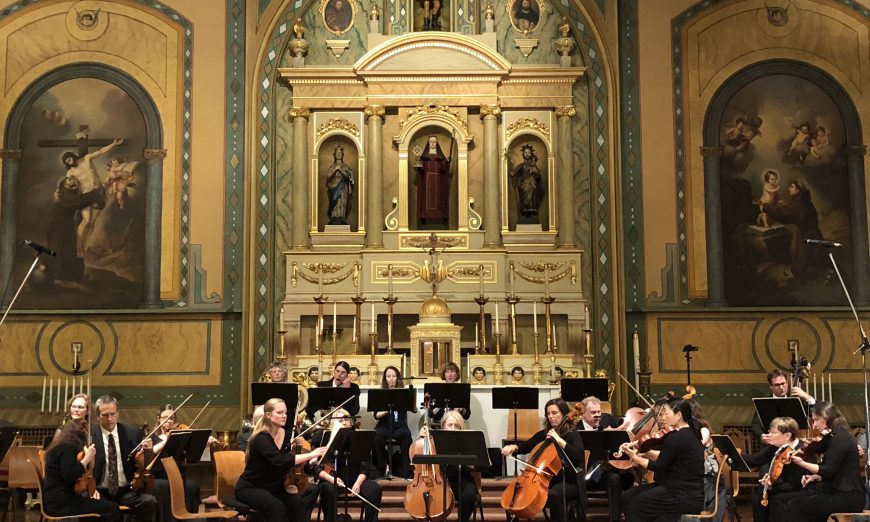Wolfgang Amadeus Mozart is recognized as one of the world’s most esteemed musical geniuses — and there’s no better way to honor him than with a music festival.
The Midsummer Mozart Festival celebrated its 43rd season with a performance at Mission Santa Clara de Asis on July 12. The orchestra also performed at Buena Vista Winery in Sonoma on July 14.
The Bay Area-based festival is the only music festival in North America exclusively dedicated to Mozart. The festival was co-founded by conductor George Cleve, oboist Ron Hubbard and horn player Wendell Rider in 1974.
Cleve, the music director of the San Jose Symphony at the time, served as the conductor and artistic advisor for the festival up until his death in 2015 — and it seemed as though the festival would die with him.
Many of the members on the Board of Directors wanted to retire when Cleve died. The festival took a break in 2016 until a group of musicians spearheaded its revival.
One of those musicians was Robin Hansen, first violin at the San Francisco Ballet Orchestra and the festival’s concertmaster for the past 20 years. She was asked to play two weeks of the four-week festival back in 1996, and has been playing in the festival ever since.
“We had a lot of audience members who had been coming for decades,” Hansen said. “And we are a brand. Midsummer Mozart Festival is a brand…We have to keep going.”
Hansen, now the musical and executive director, found new members on the Board of Directors. She and a smaller group of musicians played chamber music concerts for the time being. The festival returned last year with two concerts — and no conductor.
But now the baton has been passed on to Paul Schrage, Cleve’s last student.
Schrage, the music director of Symphonia Caritas, studied under Cleve some years ago, so he was familiar with the festival but was never involved with it. It wasn’t until around March that he received an invitation from Hansen to conduct this year’s festival. He has found this position to be a burden and a joy.
“I certainly feel the weight of the responsibly of keeping the standards high,” Schrage said. “It’s a real joy to have seen all the supporters of the festival just wanting it to continue and all the people who really just loved the festival, so it’s just really great to be involved and continue it on. And I certainly do feel the responsibility more than I do with other orchestras that I’ve conducted. Probably more because he was my teacher, and you feel it more personally, for sure.”
The orchestra kicked off the night with Symphony No. 17 in G major, K. 129 and then transitioned to Violin Concerto No. 3 in G, K.216, featuring violin soloist Ani Bukujian.
Bukujian, who’s originally from Los Angeles, began playing the violin at two and a half years ago. She was accepted to the prestigious Julliard School in New York and studied there for six years before moving back to the west coast. She was recently named principal second violinist for the San Francisco Ballet Orchestra.
After earning the position, she met Hansen, who soon asked Bukujian to play the Violin Concerto.
“I’m very thrilled to be here — this is my first time playing a Mozart concerto with an orchestra,” Bukujian said. “I’ve played for my teachers, I’ve played for recitals and everything with the piano, but it’s my first time playing with an orchestra. Mozart is obviously one of the greats. He’s a legend. And so it feels really amazing to have been able to play one of his concertos with the orchestra.”
Additionally, Bukujian performed her own cadenza during the concerto. She was asked to compose a cadenza for this concerto in an elective class at Julliard. So she quickly wrote it up and performed it to the praise of her teacher. She never thought she would get the chance to perform her cadenzas for an audience.
“It was a great opportunity to just play them because they were just sitting in my drawer, and I was like, ‘Okay, well, here’s a chance to actually perform them,’” Bukujian said.
After the Violin Concerto No. 3, Schrage took a moment to speak to the audience. He explained why he thinks summer is the best setting for the festival.
“I think that everyone has some sort of connection to Mozart,” Schrage said. “Everyone feels something when listening to Mozart… And having a winter Mozart festival doesn’t seem to make sense, now does it? Because the spirit of the music and the joy that it conveys can only be found on a day like this.”
The orchestra then ended the night with Symphony No. 36 in C, K. 425 — also known as the Linz Symphony.
As the festival’s artistic advisor, Schrage was tasked with choosing which of Mozart’s works to perform, and he thought this was a beautiful piece to perform, especially because of its slow movement.
“I think the sound and the hall just blended really nicely,” Schrage said. “It’s sometimes challenging to conduct in halls that aren’t built first and foremost as concert halls. And so the room was pretty boomy with a lot of brick and stone, but the slow movement of the Linz just blended really nicely.”
The orchestra received a standing ovation from the audience once the show came to an end.
“I know that the audience loves the music,” Hansen said. “Sometimes when I have time to look away from my music, maybe when the soloist is playing a cadenza, I can look at people out in the audience with their eyes closed and a smile on their face.”
For more information on the Midsummer Mozart Festival and its upcoming performances, visit www.midsummermozart.org/.
Correction: A previous version of this article mistakenly misspelled Robin Hansen’s last name. We apologize for the error.






